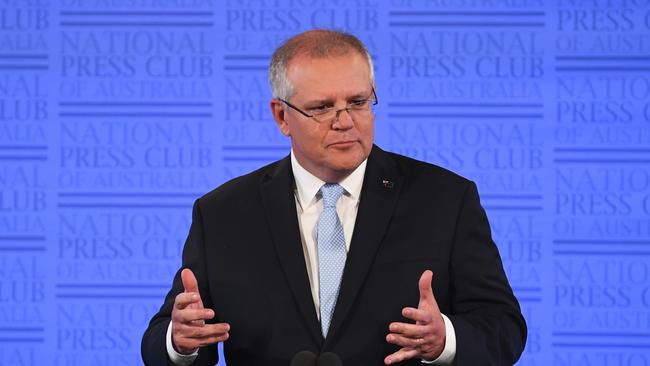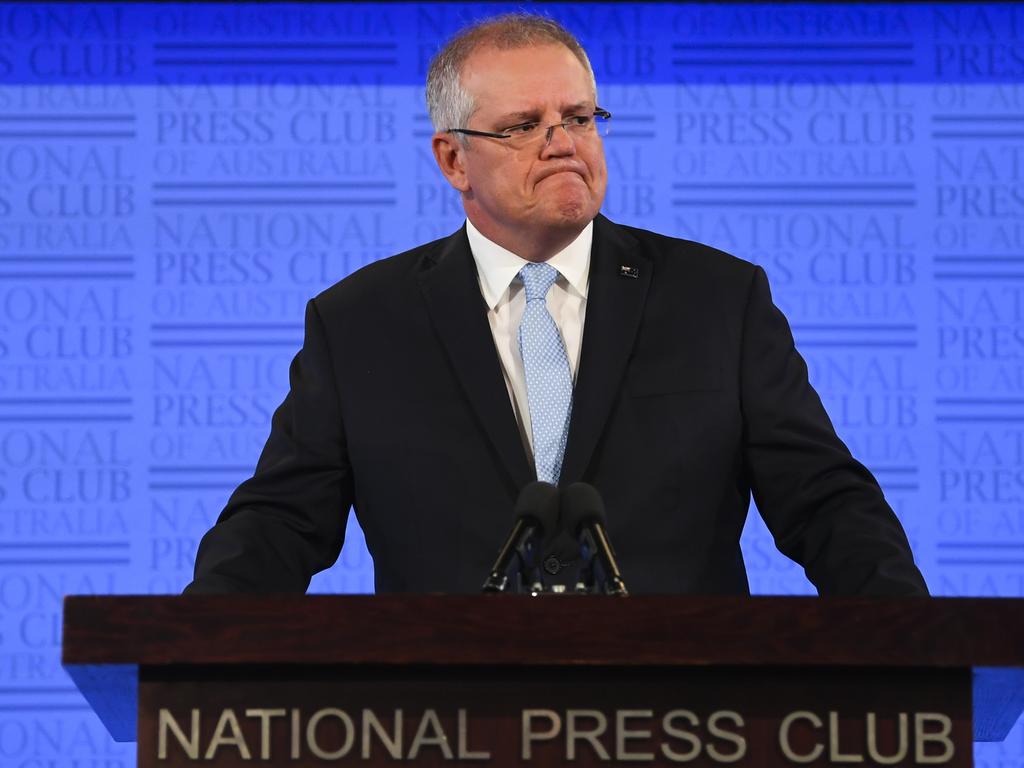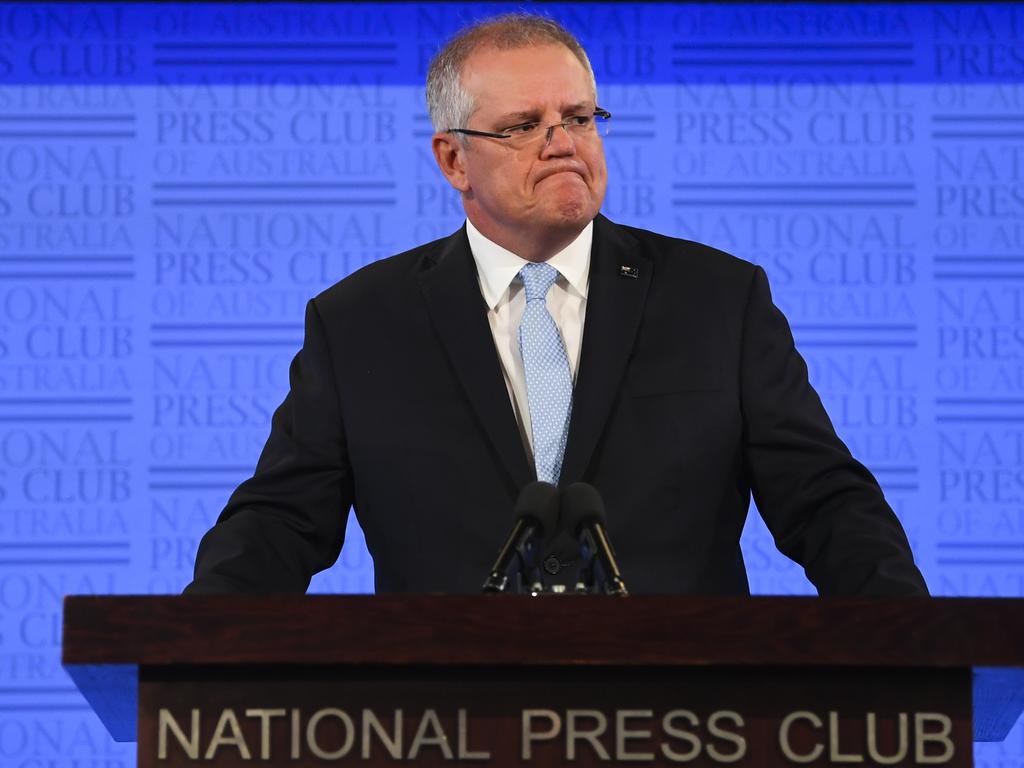
The Prime Minister wants to refashion the rule book on Liberal governance, an essential task given the economic crisis. This has been obvious for the past several months. It is now given another tangible form in the IR challenge.
Morrison’s aspiration is a fusion of economic reformism, transactional deal-making and centrist pragmatism in pursuit of a single goal — job restoration in the private economy.
His speech on Tuesday was a long overdue effort to resurrect a tenable IR policy for a Liberal government after years of neglect and fear of public opinion. It will excite Morrison’s critics, who cannot abandon their cherished image of him as a divisive ideologue and who fear his new “national unity” guise might work.
Morrison’s industrial relations approach differs from the “big bang” reformism of John Howard’s Work Choices, and the IR retreat of the Abbott and Turnbull eras based on imposing greater legal accountability on unions as distinct from seeking productivity gains from workplace reform.
There are two critical points. Morrison is not saying IR reform starts or ends the new reform process; it is merely one brick in a structure that involves skills, tax, infrastructure, energy, technology and migration. But he is saying the IR system is relevant for jobs — in that sense he repudiates those progressive ideologues arguing any talk of IR reform is a step into the past.
It is also important to grasp what Morrison is not doing. This is not an Accord. It is not the Liberal version of the ALP-ACTU Accord of the 1980s.
Neither trade unions nor Labor have any wish to re-establish the Accord, let alone Morrison. It is, however, an effort to create concord in the specific arena of IR change, to bring the parties — business, unions, government — together, to put them under pressure to strike deals in the cause of job creation and restoration.
Indeed, it is a more elaborate leap from the post-election strategy agreed between Morrison and Industrial Relations Minister Christian Porter, which Porter previously described as rejecting “zero-sum game” IR policy in favour of seeking “changes that benefit both employers and employees”.
Morrison committed to the arrangements after talking directly with ACTU secretary Sally McManus and business groups. “The first step is to get everyone back in the room,” he said. “To bring people together, that’s our job. And in particular, that’s my job.” This constitutes a pivotal definition of his prime ministership: to bring people together. Morrison gives this more weight than any PM since Bob Hawke — while recognising, upfront, it may not succeed. Having achieved concord to an extent in the national cabinet with the premiers, Morrison seeks the more difficult task of making progress with unions and employers in the IR system.
Labor will be hostile to the process. It loathes Morrison’s tactic. His aim is to marginalise the federal Labor Party. To the extent deals are struck, that means problems between the ACTU and ALP. The media will be cynical; after all, it bagged Hawke’s consensus before it succeeded, so its scepticism about Morrison will be a given.
The other certainty is that Morrison’s stance will be attacked by the populist conservatives and libertarian right, as usual, arguing that chasing consensus with unions is doomed and any policy result is sure to be hopelessly compromised. In truth, it is a difficult goal, but the Australian public prefers compromise agreement to useless confrontation.
Going to the heart of the government’s strategy, Porter told The Australian: “If there is one lesson to be learnt from many of the Hawke-Keating reforms it is that the product going into the parliament is ultimately strengthened by having as much agreement as possible in its development.”
The parliament hardly looks kindly on IR reform. Much of this plan is not just about carrying the public but putting pressure on the parliament. The key to success is the transformed economy. Morrison outlined the settings: “Unemployment at around 10 per cent, global trade expected to fall by up to one-third, global foreign direct investment by up to 40 per cent — arguably the most challenging environment this country has ever faced outside of wartime.”
If this cannot change attitudes then Australia has a third-rate future. Morrison, in effect, is asking the main stakeholders to show their responsibility. He says Porter will lead a series of five working groups “for discussion, negotiation and, hopefully, agreement”. They cover award simplification; reviving enterprise bargaining; issues of casuals and fixed-term employees; compliance and enforcement; and greenfields agreements for new enterprises. This is no sweeping overhaul of the system. It is about repair, about practical gains that can make a difference with jobs. The purpose is to walk away from past ideological rail tracks.
Morrison nailed the problem with today’s IR system: “It has, to date, retreated to tribalism, conflict and ideological posturing. (It) has settled into a complacency of unions seeking marginal benefits and employers closing down risks, often by simply not employing anyone. The system has lost sight of its purpose — to get the workplace settings right, so the enterprise, the business, can succeed, so everybody can fairly benefit from their efforts and contributions.”
Morrison said the purpose was to “find a pathway to sensible, long-lasting reforms with just one goal, make jobs”. He wanted everybody “to put their weapons down on this”. And that meant people on his own side. Morrison believed Australians “will take a very dim view” of any group that wasn’t ready to deal in good faith.
In a peace offering the government has taken its Ensuring Integrity bill off the table — the bill designed to crack down on unlawful behaviour, notably by the construction union. Its belief in this bill remains; if the entire process fails, expect the bill to be revived. Keen to underline his realism about the entire project, Morrison said: “It may succeed. It may fail. But I can assure you, we’re going to give it everything we can.”
Porter said he would appoint a civil servant or ex-civil servant as deputy chair to assist him. A secretariat would be created mainly from Treasury and Finance to provide running assessments of job creation and productivity gains from various options considered by the working groups. His approach as chair would differ from group to group.
On compliance and greenfields issues the government “would take a more active role in presenting a position” given the work done in these areas since the election. On awards and enterprise bargaining the government would put the data before attendees and act as a broker to “listen and absorb” aiming to “synthesise” a position. “The point of the process is no one is bound by any product the government may ultimately choose to take to the parliament,” Porter said.
He would aspire to find agreement. If agreement were not possible, compromise positions would be put to parliament in an effort to secure legislative backing.
Initial feedback from the ACTU and business lobbies was essentially positive. But the road ahead will be arduous. The issue is whether the nation can lift its vision and decide against the misery of prolonged high unemployment and weak growth.
It is useful to recall Hawke’s brilliant advocacy of his consensus policy before the 1983 election. He said the nation suffered “the increasing erosion of any sense of common national purpose” where “individuals and groups have been encouraged to perceive and pursue their own self-interest”, leading to “the rupturing of Australian society”. But high unemployment from the 1980s recession had broken the mould and within the public “there is a desire for healing, for a sense of common purpose”. Sound familiar?








Scott Morrison has broken decisively from Liberal Party tradition — again. After authorising the biggest emergency fiscal expansion in history to combat the downturn, he has launched a consensus approach to win industrial relations reform in the teeth of looming 10 per cent unemployment.